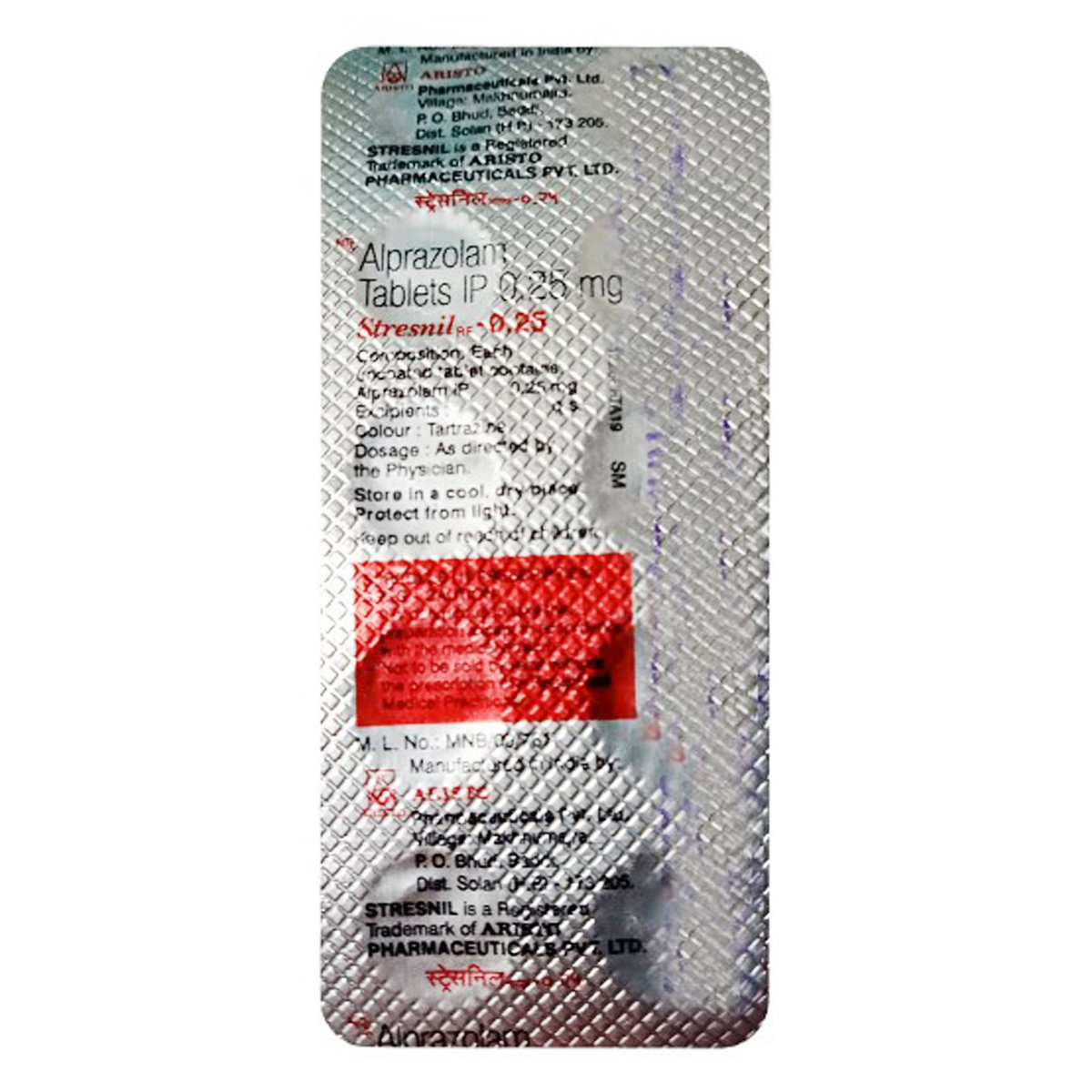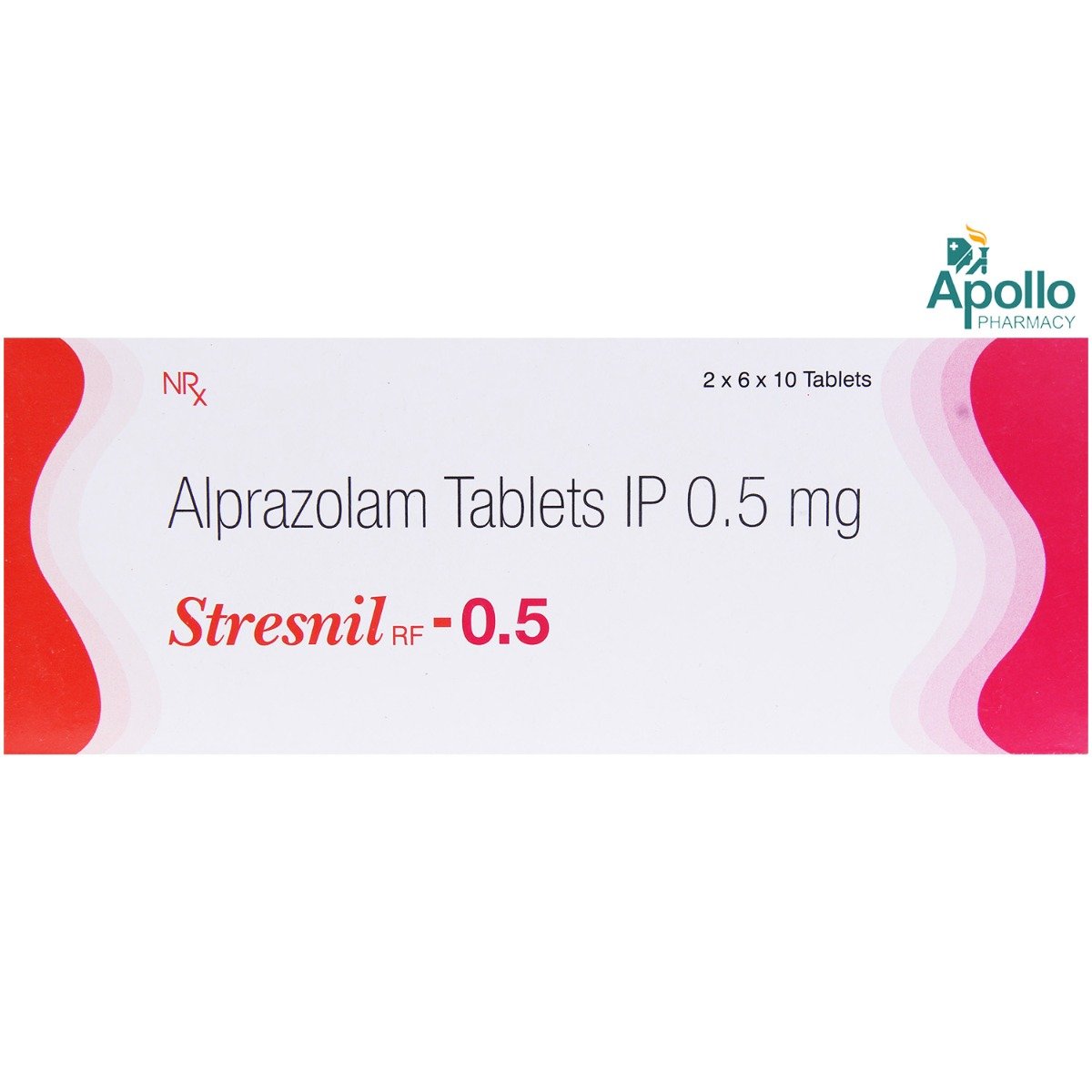Alprazolam+melatonin
About Alprazolam+melatonin
Alprazolam+melatonin belongs to a class of medication called sedatives and hypnotics, primarily used to treat sleeplessness (insomnia). Besides this, it also helps to provide a calming effect on anxiety disorder and panic disorder. Insomnia is a sleeping disorder in which a person finds difficulty in falling asleep or staying asleep. Due to anxiety and panic disorder, a person cannot sleep due to disturbances in their circadian cycle and hormonal imbalance in the brain like melatonin.
Alprazolam+melatonin is a combination of two medicines: Alprazolam and Melatonin, which helps a person fall asleep faster and stay asleep during the night. Alprazolam is a benzodiazepine (BZD) that increases the activity of a chemical messenger in the brain known as GABA, reducing the abnormal and overactivity of brain cells (neurons), which in turn relaxes the brain and promotes sleep. On the other hand, Melatonin is a natural hormone that activates the ON-OFF mechanism of a person's sleeping-waking cycle (circadian cycle), thereby inducing sleep during the nighttime.
Take Alprazolam+melatonin with or without food and swallow whole with a glass of water. Do not break, crush, or chew it. Your doctor will advise you how often you take Alprazolam+melatonin based on your medical condition. The most common side effects of Alprazolam+melatonin include drowsiness, tiredness, headache, depressed mood, daytime drowsiness, stomach pain, and dizziness. Most of these side effects of Alprazolam+melatonin do not require medical attention and gradually resolve over time. However, if the side effects persist or worsen, please consult your doctor.
Tell your doctor if you have an ongoing medical condition, including depression, diabetes, an autoimmune disorder, or high blood pressure. If you are known to be allergic to Alprazolam+melatonin or any other medicines, please tell your doctor. If you are pregnant or breastfeeding, inform your doctor before taking Alprazolam+melatonin. Alprazolam+melatonin should be used with caution in elderly patients as there is an increased risk of adverse reactions such as dizziness, muscle weakness, and drowsiness.
Uses of Alprazolam+melatonin
Medicinal Benefits
Alprazolam+melatonin belongs to a class of sedatives and hypnotics, primarily used to treat insomnia (difficulty in falling asleep or staying asleep). Alprazolam+melatonin is a combination of two medicines: 'Alprazolam' and 'Melatonin', which helps a person fall asleep faster and stay asleep during the night, which has been disturbed due to anxiety or panic disorder. Alprazolam+melatonin helps relax the brain's exciting chemicals (GABA), allowing a person to sleep easily and stay asleep during the whole night without any disturbance.
Directions for Use
Storage
Side Effects of Alprazolam+melatonin
- Tiredness
- Dizziness
- Headache
- Drowsiness
- Stomach pain
- Depressed mood
Drug Warnings
Before your doctor prescribes your Alprazolam+melatonin, you should tell your doctor if you have allergies or not. With it, also tell if you are pregnant or breastfeeding as the use of this medication is restricted to be used in pregnancy and breastfeeding. Elderly people are more responsive to the side effects of the drug, so they should tell every product, including the herbal ones to their doctor so that doctor can decide the dosage for them. Inform your doctor about myasthenia gravis (muscle weakness), drug addiction, chronic pulmonary insufficiency, narrow-angle glaucoma, and kidney/liver problem before taking Alprazolam+melatonin. Do not take Alprazolam+melatonin with opioids as it may cause breathing problems, drowsiness and coma.
Drug Interactions
Drug-Drug Interactions: Alprazolam+melatonin may interact with anti-depressants (fluoxetine, fluvoxamine, nefazodone), antibiotics (erythromycin, rapamycin), antifungals (ketoconazole), anti-HIV drugs (delavirdine), pain killers (morphine, codeine, dihydrocodeine, buprenorphine).
Drug-Food Interactions: Foods, including grapefruit juice, may worsen the side effects of the medicine (such as sleepiness or slowed breathing). Avoid taking such foods that can affect the action of Alprazolam+melatonin.
Drug-Disease Interactions: The possible disease interaction include acute alcohol intoxication, closed-angle glaucoma, drug dependence, kidney/liver disease, respiratory depression, seizures, depression, obesity, and paradoxical reactions
Drug-Drug Interactions Checker List:
Safety Advice

Alcohol
unsafeAlcohol is sedative in nature, so taking it with Alprazolam+melatonin may interrupt the sleep cycle. Alcohol may worsen the effects of Alprazolam+melatonin so one should not consume it with Alprazolam+melatonin.

Pregnancy
unsafeAlprazolam+melatonin is a category D pregnancy drug. It is not recommended for use during pregnancy, especially in the second and third trimesters as it may cause harm to the unborn baby.

Breast Feeding
unsafeAvoid breastfeeding while taking Alprazolam+melatonin as it may be excreted in breast milk and cause adverse effects in the baby.

Driving
unsafeAlprazolam+melatonin may cause dizziness, double vision, or drowsiness in some people. It is an offence to drive if Alprazolam+melatonin affects you. Therefore, avoid driving if you feel drowsy, dizzy, or experience any vision problems after taking Alprazolam+melatonin.

Liver
cautionTake Alprazolam+melatonin with caution, especially if you have or had a history of liver diseases/conditions. The dose may be adjusted by your doctor as required.

Kidney
cautionTake Alprazolam+melatonin with caution, especially if you have or had a history of kidney diseases/conditions. The dose may be adjusted by your doctor as required.

Children
cautionNot enough scientific data available for Alprazolam+melatonin, hence it is best to consult a child specialist.
Habit Forming
Diet & Lifestyle Advise
- Keeping a fixed time to go to bed and wake up consistently every day helps maintain a better sleeping and waking plan.
- Engage yourself in workouts, dancing, and walking that help promote calmness in the body so that you can enjoy a good night's sleep.
- Taking naps in a day can make it harder to fall asleep at night, so one should try to limit a nap to no more than half an hour and don't nap after 2 p.m.
- Limit caffeine and alcohol consumption as it will not let you sleep and causes frequent urination.
- Avoid large, heavy meals before bed. One can have a light snack that helps to avoid heartburn.
- Avoid consumption of alcohol as it may increase drowsiness.
- Take less liquid before bedtime so that you won't have to urinate as often. One must keep their worries and planning aside and enjoy a warm bath or a massage before bedtime. It will help in having a good night's relaxing sleep.
Special Advise
- Do not take Alprazolam+melatonin for a prolonged time as it may lead to mental or physical dependence on Alprazolam+melatonin.
Patients Concern
Disease/Condition Glossary
Insomnia: It is a sleep disorder that affects many people in the world. Persons dealing with insomnia don't feel energetic or refreshed after waking up from a long night's sleep. It is of two types: Acute and chronic insomnia. Acute insomnia may last from one night to a few weeks and occurs due to stress or life changes. Chronic insomnia may last from more than 3 nights per week to more than 3 months, making a person either wake up the whole night or cause trouble in falling asleep. Causes of insomnia include stress, physical pain, any traumatic event, psychological issues including depression, diabetes, side effects of certain medications, and many more. Signs and symptoms of insomnia include fatigue, irritability, trouble concentrating on tasks, and mood changes.
FAQs
Alprazolam+melatonin is a combination of two medicines: Alprazolam and Melatonin, which helps a person fall asleep faster and stay asleep during the night. Alprazolam is a benzodiazepine (BZD) that increases the activity of a chemical messenger in the brain known as GABA, reducing the abnormal and overactivity of brain cells (neurons), which in turn relaxes the brain and promotes sleep. On the other hand, Melatonin is a natural hormone that activates the ON-OFF mechanism of a person's sleeping-waking cycle (circadian cycle), thereby inducing sleep during the nighttime.
It is advised not to take Alprazolam+melatonin if you have a bleeding disorder as taking this medicine may worsen the medical condition. The use of Alprazolam+melatonin is restricted in patients dealing with diabetes and depression.
It is advised not to stop taking this medicine by yourself. If you are noticing an improvement in their condition, then you should first consult with their doctor. The doctor will gradually reduce the dose and then stop it to avoid withdrawal effects
It is suggested not to indulge in any heavy exercise like running or put up heavyweights as it can make you active and wake for a long time. However, you can practice some mindful activities like meditation to make yourself relax and sleep properly. Doing heavy workouts before bed increases blood circulation and body temperature of the body and creates difficulty sleeping. Your bedroom should be dark and should be mend for only sleep.
It has been reported in some patients that Alprazolam+melatonin may cause drowsiness. Therefore, it is recommended to avoid driving or any other activities that require mental alertness after taking Alprazolam+melatonin.
Yes, it has been observed in some persons that Alprazolam+melatonin may cause mental or physical dependence if used for a prolonged time. Therefore, take Alprazolam+melatonin only in dose and duration as advised by your doctor.
Alprazolam+melatonin is habit-forming and should be used for a short duration in adults and should only be taken after discussing it with doctors. However, taking it for a longer time may cause extreme drowsiness the next day. Thus, one should always take this medication within the prescribed time limit.




